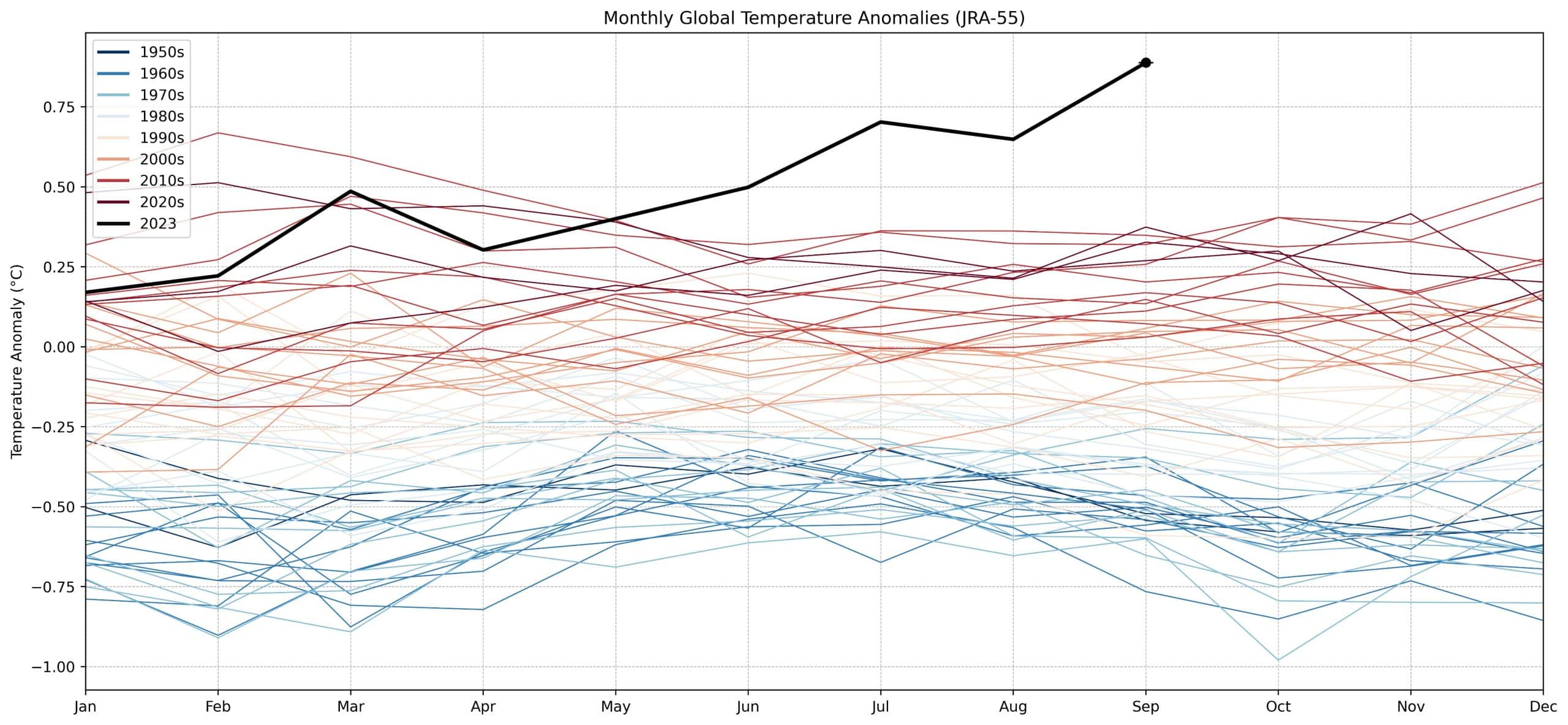The new record puts this year on course to be the hottest our planet has ever experienced.
—
2023 On Track to Be the Hottest Year Ever
The world just experienced its hottest September ever after shattering the previous record by an “extraordinary” margin, with temperatures at around 1.75C above pre-industrial levels, according to several climate models.
The Copernicus Climate Change Service (C3S), Europe’s leading earth observatory agency, said the average global surface air temperature last month was 16.38C, 0.93C above the 1991-2020 average for September and a staggering 0.5C above the previous warmest September recorded in 2020. This makes it “the most anomalous warm month of any year” in the ERA5, the latest climate reanalysis produced by the European Centre for Medium-Range Weather Forecasts (ECMWF) on behalf of C3S, extending from 1940 onwards.
After record-breaking June, July, and August, the new measurements put 2023 on track to be the hottest year the planet has ever experienced. The average global temperature in the first nine months of the year was 0.52C higher than average and 0.05C higher than the same period in 2016, the warmest calendar year to date.
In Europe – the world’s fastest-warming continent, warming twice as fast as any other continent – temperatures were 2.51°C higher than the 1991-2020 average, and 1.1°C higher than the previous warmest September recorded in 2020, C3S data shows.

September was the most anomalously warm month on record. Image: Zeke Hausfather/X.
Extreme temperatures did not only affect people around the world but also marine ecosystems, as sea and ocean temperatures reached their warmest surface temperatures on record. August as a whole saw the highest global monthly average sea surface temperatures ever recorded across all months – 20.98C, while daily temperature records were broken every day from July 31 to August 31, according to Copernicus data. September followed closely, with average sea surface temperatures reaching 20.92C, the highest for the month and only second in history after August 2023.
You might also like: Antarctic Sea Ice Sets Record Low Maximum Extent By ‘Wide Margin’, New Analysis Shows
Reactions
Climate scientists around the world are in disbelief. Ed Hawkins, lead author of the Intergovernmental Panel on Climate Change’s (IPCC) Sixth Assessment Report (AR6), called the latest measurements “shocking” and “bewildering.”
“This month was, in my professional opinion as a climate scientist – absolutely gobsmackingly bananas,” said fellow climate scientist Zeke Hausfather on social media platform X.
Surprising. Astounding. Staggering. Unnerving. Bewildering. Flabbergasting. Disquieting. Gobsmacking. Shocking. Mind boggling. pic.twitter.com/hNtARXD20F
— Ed Hawkins (@ed_hawkins) October 5, 2023
“The unprecedented temperatures for the time of year observed in September – following a record summer – have broken records by an extraordinary amount. This extreme month has pushed 2023 into the dubious honour of first place – on track to be the warmest year and around 1.4C above preindustrial average temperatures,” said Samantha Burgess, C3S Deputy Director.
Last month, Burgess said that the world “will continue to see more climate records and more intense and frequent extreme weather events impacting society and ecosystems, until we stop emitting greenhouse gases.”
There is no doubt among the scientific community that global warming has led temperatures globally to hit record highs this year, a trend that is set to persist in the years to come, according to a World Meteorological Organization (WMO) report published in May. The UN body found that there is a 98% chance that at least one of the next five years will be the hottest on record and a 66% chance of temporarily exceeding 1.5C above the 1850-1900 average for at least one of the five years.
Besides planet-warming greenhouse gases, experts are keeping a close eye on El Niño, a weather event associated with the warming of sea surface temperatures in the central-east equatorial Pacific that typically occurs every few years. Earlier this year, experts had warned that its comeback this year is making it “very likely” that global average temperatures will exceed 1.5C of warming, beyond which even half a degree will significantly worsen the risks of drought, floods, extreme heatwaves, and result in food and water insecurity and poverty for millions of people worldwide.
Prolonged heatwaves indicate that the phenomenon is far from over. Speaking with the Washington Post, Michael McPhaden, a senior scientist at the National Oceanic and Atmospheric Administration (NOAA), said the El Niño is not set to peak until later this year.
“There is plenty more heat waiting in the wings,” McPhaden said, adding that more records are expected to be broken in the coming months.
Call to Action
Burgess called for “ambitious climate action” at the COP28, the year’s most important climate summit coming up in less than two months. The conference serves as a pivotal event in the international climate change agenda, bringing together countries, stakeholders, and experts to drive collective action, shape global climate policy, and accelerate efforts to combat climate change and secure a sustainable future for all. But unless all countries step up their efforts and set more ambitious targets to tackle climate change, the consequences of global warming might well be come irreversible.
You might also like: Extreme Heat Persists Around the World As Scientists Warn El Niño Has Yet to Peak


















